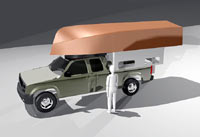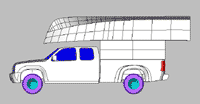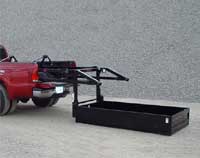| Design by Chris Ostlind- Salt
Lake City, Utah - USA |
Hangin’ Out with the Popular Mechanics
Guys
OK, right off the top, here, I’m going to admit
that this design study was instigated originally after
looking at an article on the Jim Michalak design,
the Harmonica.
The more I studied the photos in the story, the more
it flashed on me that this boat would look very similar
to a typical pickup truck, cab-over camper if it were
flipped upside down.
 |
The Harmonica
design of Jim’s could actually serve
as a jumping-off point to draw-up a really
utilitarian camper/boat
(click
images to enlarge) |
|
Then, in one of those absolutely weird, Popular Mechanics,
moments we all get after too many years in the garage
twiddling with stuff, it hit me. The Harmonica design
of Jim’s could actually serve as a jumping-off
point to draw-up a really utilitarian camper/boat
that a retiree could use all over the country while
he lived in the camper as his home on wheels. I’m
kinda poking my finger in the eye of the guys at Pop
Mechanics because all my life they constantly ran
all these wild and crazy inventions that really stirred
my imagination in a big way. The Flippin’ Boat
is right up their alley.
I’m not so sure the little woman in this retiree’s
life would actually go for having a 1960’s inspired,
Tomorrowland boat on their camper. Nor was I convinced
that there wouldn’t be hell to pay for even
suggesting the potential over Mac and Cheese with
weenies. But, the idea looked kinda fun to me anyway,
so I started fooling with a few possible lines for
the boat that I hoped would conquer Route 66 one day.
| I’m
kinda poking my finger in the eye of the
guys at Pop Mechanics because all my life
they constantly ran all these wild and crazy
inventions that really stirred my imagination
in a big way. |

|
|
The first thing would be to settle on a hull shape
that would work well in a lot of conditions and could
carry the load of a superstructure that would emerge
from the camper box that goes in the bed of a truck.
I wanted a cab-over design so that the hull could
be fairly long when compared to the height of the
camper form.
I settled on the moderate vee hull without a spray
chine to keep things simple to build. I like the way
moderate vee handle in a lot of widely varied conditions
without pounding when things get rough. The moderate
depth of the vee means that this boat can be taken
into reasonably shallow water without problems. That
will make it easier to anchor, take stuff ashore while
wading and they are pretty easy to build. The form
also presents a surprisingly good aerodynamic shape
to the wind at highway speeds.
Keep in mind that this boat has to work upside down
and right side up, or it becomes a fairly stupid exercise
in a real hurry. A crappy looking boat would never
appeal to the guys at Popular Mechanics, even if it
did work decently.
 |
The form
presents a surprisingly good aerodynamic
shape to the wind at highway speeds.
|
|
I wanted windows so the cabin area would be airy
inside. This is a pretty boxy shape, so it can’t
look like a shed that has been plunked down on the
hull.
What about the utility of the design? You can see
that the Flippin’ Boat has a nice front porch
area so that you can fish, or sit in the afternoon’s
fading sunlight with a cold one in hand or set-up
BBQ. There’s another porch on the stern end
of the hull for fuel and engine business, as well
as a space for letting your flatulent uncle have a
little privacy.
The main cabin is fashioned to follow the form as
provided by the bed of the truck. In this case, it
works out that there is a wonderful, stacked sensation,
of a multi-level house with lots of big bright windows
to let in the light and the wonderful views of the
lake or river on which the boat might be anchored.
| I wanted windows
so the cabin area would be airy inside. |

|
|
I gave all the boxy corners a radius turn to soften
the look of the cabin once launched. There isn’t
a whole lot you can do to a basically boxy form that
fits in the bed of a pickup for stability. This change
made a world of difference and really improved the
overall looks of the design.
One of the big concerns for me was how to make furniture
for the camper that would also work for the boat.
Lots of stuff is sort of no-brainer like the boat
flips and the bed becomes… the couch/bed when
you put the cushion on the other side of the same
structure. But what about tables and cabinets and
stuff like that? I don’t now too many folks
who would want their dish cabinet turned upside down
and find it sitting near the floor of their boat.
I designed all the simple, wall mounted fixtures
so that they were on swivels. As the camper is turned
over to become a boat, the fixtures rotate around
to their normal, right side up position and none of
the interior contents are disturbed. Of course, this
means that the placement has to make sense for both
scenarios, but it turns out to be not such a big problem
once I took a look at how it needed to work.
 |
One of
the big concerns for me was how to make
furniture for the camper that would also
work for the boat.
|
|
One other little item that deserves mention. There
is a raised, cockpit-style coaming ring around the
front porch area. This serves two purposes. As a camper,
this coaming provides a more aerodynamic seal against
the cab roof. I know it matters only a little in the
grand scheme of things with such a big hulking structure
sitting up there over the truck, but I like that the
idea was addressed in the design. Second, in boat
mode, the ring helps to deflect spray away from the
front door of the house and the front porch, aiding
in overall comfort while underway.
So, the big question is, “How do you get this
Bad Dude flipped over and in the water?” That’s
sort of important isn’t it? While I was goofing
around trying to get my brain wrapped around the practical
uses of pulleys, cables whiz-bang gadgets, etc. I
stumbled upon a Swiss designed lift system that is
being manufactured in Iowa by Stellar Industries that
will lift fairly heavy items right out of a truck
bed and deposit them on the ground in their intact,
right-side-up orientation. They even show the retrieval
of a jetski from a launching ramp as an example of
the usefulness of their device. You can checkout their
website here: https://www.xtralift.com/
When I saw that product, it dawned on me that I could
then just roll the camper over with a couple of big
curved wheel shapes mounted to the back end of the
camper and inserted into preformed pockets to hold
them fast. The hydraulic system already in the truck
bed for the lift system would now serve a second duty.
I’d only have to install a telescoping ram to
lift the bow of the boat and at some point, gravity
would do the rest, putting the boat on its hull in
the water.
| I stumbled
upon a Swiss designed lift system that is
being manufactured in Iowa by Stellar Industries
that will lift fairly heavy items right
out of a truck bed and deposit them on the
ground |

|
|
After a week on the water, retrieval of the boat
to camper status is accomplished by means of a cable
taken off a back bumper winch. The transom rotation
wheels are installed once again. A Gin Pole is mounted
to the top of the cabin and the cable goes up and
over the Gin Pole to the bow. Reel in the cable and
the bow lifts as if you were stepping a mast on a
sailboat. Once near vertical, the telescoping ram
re-attaches and the boat is gently returned to earth,
resting on the lifting mechanism as a camper.
Of course there are all sorts of little maneuvers
to make sure you don’t screw something up, such
as removal of the Gin Pole before sitting the boat
back in its lifting cradle; stuff like that which
is too much written material for this article, but
you get the idea.
The outboard is stored in the camper when not on
the boat and the fuel is stashed under the camper
in the cavity near the wheel wells in the truck bed.
Sure, there’s lot’s of detail stuff to
be worked out, but this is not a manufacturing description.
It’s only a design study to examine feasibility.
Right now, the whole thing looks more than feasible
to me and could progress to the next stage with a
financing partner who had a bent for stuff like this.
I’ve got the boat part of it covered and I’m
pretty happy with the way the boat balances in the
water, the stability of the hull form and its overall
usefulness in a wide range of water conditions. No,
it’s not meant to get up on a plane with the
small outboard that will be easily moved around by
the owner, but it will provide miles of comfortable
cruising and get terrific fuel mileage as a payback
for not being the fastest boat on the water.
 |
Right
now, the whole thing looks more than feasible
to me and could progress to the next stage
with a financing partner who had a bent
for stuff like this.
|
|
This boat was designed to fit on any extracab/clubcab
equipped, full-sized pickup with a long box. The truck
should have a pretty decent engine due to seriously
increased wind resistance and the battery and technical
add-ons that one would suspect for a full-tilt trailering
package. Stuff like tranny coolers, bigger brakes,
¾ ton, or better, load capacity axle, oil coolers,
bigger radiator, etc.
Yeah, the idea is a bit on the gimmicky side of things.
But, so what. I’ve enjoyed the process of working
out all the dual application issues (and there are
a lot of them) as well as coming up with a nice aesthetically
pleasing design that could actually work in the real
world if someone cared to build it.
One final note: The name Flippin’ Boat should
be pretty obvious as to how that came about. There
is, however, one extra little sidebar piece of information
to add a bit more to the business of the name selection.
I live in Salt Lake City, Utah. A lot of folks in
this community find it offensive to swear, so most
of the conventional swear words that one would hear
occasionally have been supplanted with euphemistic,
non-swear words. Hell has become Heck and you probably
guess what the equivalent for Flippin’ would
be. I’m not of the predominant faith, but this
is just my way of tipping the cap to the local culture
in a fun manner. No offense intended to anyone.
Chris Ostlind
Lunada Design
[email protected]

Articles by Chris Ostlind:
|